- Home
- James S. A. Corey
Strange Dogs (Expanse) Page 2
Strange Dogs (Expanse) Read online
Page 2
For now, though, her house was her house and the town was the town, and she could sit at her kitchen table while the others got ready to go someplace else. Momma bird didn’t move. The more Cara looked at the bird, the less real it seemed. How could something that clearly dead ever have swum or flown or fed its babies? It was like expecting a rock to sing. The babies would be wondering what had happened by now. Calling for their mother. She wondered if they’d know to go back up to the nest with no one there to show them when.
“Mom?” Cara said as her father herded Xan and Santiago back out the door again. “I need to use the sampling drone.”
There was a line that appeared between her mother’s brows when she got annoyed, even when she was smiling at the same time. “Babygirl, you know I can’t go out right now. Your father and I—”
“I can do it. I just need to help take care of Momma bird’s babies. Just for a few days, until they’re used to her being gone. I messed things up. I need to fix them.”
The line erased itself, her mother’s gaze softening. For a moment, Cara thought she was going to say yes.
“No, baby. I’m sorry. The sampling drone’s delicate. And if something goes wrong, we can’t get a new one.”
“But—” Cara gestured to Momma bird.
“When I get back, I’ll take it out with you if you still want to,” her mother said, even though that probably wasn’t true. By the time they got back from the town, Xan would be tired and hyperactive and her parents would just be tired. All anyone would want to do was sleep. A few baby sunbirds didn’t really matter much in the big scheme of things.
Santiago’s voice came wafting in from outside with a high near-whining note of young, masculine impatience in it. Her mother shifted her weight toward the doorway.
“Okay, Mom,” Cara said.
“Thank you, babygirl,” her mother said, then walked out. Their voices came, but not distinctly enough for her to make out the words. Xan shouted, Santiago laughed, but from farther away. Another minute, and they were gone. Cara sat alone in the silence of the house.
She walked through the rooms, her hands stuffed deep in her pockets, her scowl so hard it ached a little. She kept trying to find what was wrong. Everything was in place, except that something wasn’t. The walls had the same smudges by the doors where their hands had left marks over the months and years. The white flakes at the corners showed where the laminate that held the house in place was getting old. The house had only been designed to last five years, and they’d been in it for eight so far. Her room, with its raised futon, across the hall from Xan’s, with his. Her window looking out over the dirt road her family had just walked down. The anger sat under her rib cage, just at her belly, and she couldn’t make it go away. It made everything about the house seem crappy and small.
She threw herself onto her futon, staring up at the ceiling and wondering if she was going to cry. But she didn’t. She just lay there for a while, feeling bad. And when that got boring, she rolled over and grabbed her books. They were on a thin foil tablet keyed to her. Her parents had loaded it with poems and games and math practice and stories. If they’d been able to get in touch with the networks back on the far side of the gates, they could have updated it. But with the soldiers, that wasn’t possible. All the content in it was aimed at a girl younger than Xan, but it was what she had, so she loved it. Or usually she did.
She opened the stories, looking through them for one particular image like she was scratching at a wound. It took a few minutes to find it, but she did. A picture book called Ashby Allen Akerman in Paris, about a little girl back on Earth. The image was in watercolors, gray and blue with little bits of gold at the streetlights. Ashby and her monkey friend, TanTan, were dancing in a park with the high, twisting, beautiful shape of the Daniau Tower behind them. But the thing Cara was looking for was on the side. An old woman, sitting on a bench, throwing bits of bread at birds that her mother called pigeons. That was where the rage came from. An old woman being kind to a bird and nobody was dying. No one was hurt. And it wasn’t even exactly a lie, because apparently she could do that on Earth. In Paris. Where she’d never been and didn’t have any reason to think she’d ever go. But if all the things in her books were about other places with other rules, then none of them could ever really be about her. It was like going to school one morning and finding out that math worked differently for you, so even if you got the same answer as everyone else, yours was wrong.
So no, it wasn’t a lie. It went deeper than that.
She made herself a bowl of bean-and-onion soup, sitting at the counter by herself as she ate. She’d half expected that, as upset as she was, she wouldn’t be able to keep the food down. Instead, eating seemed to steady her. The quiet of the house was almost pleasant. Something about blood sugar, probably. That was what her father would have said. Momma bird’s skin had started shining, like it was growing a layer of oil or wax. It could stay there on the counter. She thought about taking it back in case the babies would understand that they shouldn’t wait. That they were on their own. She hoped they could get back up to the nest. There were things that would eat baby sunbirds if they couldn’t get someplace safe.
“Fuck,” Cara said to the empty house, then hesitated, shocked by her own daring. Her mother didn’t allow profanity, not even her father’s, but they weren’t here right now. So like she was running a test to see if the rules were still the rules, she said it again. “Fuck.”
Nothing happened, because of course no one was watching her. And since no one was watching…
The sampling drone was in a ceramic case next to her mother’s futon. The latches were starting to rust at the edges, but they still worked. Just a little scraping feeling when she pulled them open. The drone itself was a complex of vortex thrusters as wide as her thumb connected by a flexible network of articulated sticks able to reconfigure itself into dozens of different shapes. Two dozen attachable sampling waldoes built for everything from cutting stone to drawing blood stood in ranks in the case like soldiers, but Cara only cared about the three grasping ones. And of them, really just the two with pliable silicone grips. She put the waldoes in her pocket, hefted the drone on her hip as if she was carrying a baby, and shoved the case closed again before she headed out to the shed.
Momma bird and the drone fit into her father’s cart with plenty of room to spare. She thought about it, then grabbed a little hand spade too. She’d use the drone to put the babies safe in their nest, and then give Momma bird a proper burial. It wasn’t enough, but she could do it, so she would.
The sun was starting its long slide down into night. The low mist that came from the east smelled as bright as mint, and the shadows of the trees all had a greenish tint against the reddening light. The cart had one wheel that stuck sometimes, skidding along behind her like a stutter until it broke loose again. Cara put her head down, her mouth set, and marched back toward the pond. The tightness between her shoulder blades felt like resolve.
The forest was mostly hers. Xan played there some, but he liked the other kids more than she did, so he spent more time in town. Her mother and father stayed near the house or working on the community greenhouse—which wasn’t really a house or green—to keep the food supplies coming. She knew what the sounds of the forest were, even if she couldn’t always figure out what made them. She knew the drape of a hook vine from a straight one, the call of a red clicker from a green one. Most of the things that lived there didn’t have names. Laconia was a whole world, and humans had only been on it for about eight years. Even if she gave names to everything she saw every day for the whole rest of her life, most of the species there would stay nameless. It didn’t bother her. They just were what they were. Common things got names so that she and her schoolmates and the grown-ups could talk about them. Sunbirds, rope trees, tooth worms, glass snakes, grunchers. Other things, no one talked about, so they didn’t need names, and even if she named them, she’d probably just forget.
That
wasn’t strange, though. All names were like that. A shorthand so people could talk about things. Laconia was only Laconia because they called it that. Before they’d come, it had been nameless. Or if not, the things that had named it were all dead now, so it didn’t matter.
She reached the pond, a few bright-gold streaks in the sky where the last of the sun still lit the high clouds. The baby sunbirds were still in the water, peeping in distress at her arrival. The water was dark already, like it had pulled the shadows under the trees into it. The night-feeding animals would come out soon—scratchers and hangman monkeys and glass snakes. She slaved the drone to her handheld. The control panel was more complicated than she was used to, with half a dozen control modes listed down the side that she didn’t understand. She was pretty certain she could do everything she needed with only the basic setup. She just needed to get the babies up out of the water and safe into their nest. And maybe take some food up to them. Do the things Momma bird had done. Then she could bury Momma bird, and things would be…not right. But the least wrong she could make them. She took the waldoes out of her pocket and compared them to the babies, squinting in the deepening gloom to see which of them looked like they’d be able to hold on to the little bodies but not hurt them.
“I’m sorry,” she said to the pale, round-mouthed birds as she fit the smallest waldo onto the drone. “I’m new at this.”
One of the babies caught sight of Momma bird’s body in the cart and tried to haul itself out of the water to waddle toward her. It was as good a place to start as any. Cara sat cross-legged on the clover and started the drone. It whirred as it rose in the air.
The first baby shrieked, hissed, and ran. Cara smiled and shook her head. “It’s okay, little one. It’s only me,” she cooed. “Everything’s going to be all right.”
Only it wasn’t.
The babies scattered to the edges of the pond and bit at the drone when it came near. When she was able to get a grip on one, it wriggled out a meter and a half above the ground and fell back into the water. Cara didn’t want to hurt them, but the light was fading faster now, and she had to get them up to the nest and then bury Momma and still get back home before her parents and Xan. The time pressure made everything harder. She didn’t realize she was clenching her teeth until her jaw already hurt. After nearly an hour she’d only gotten three safely back to the nest. Momma bird lay in the cart, sightless eyes reproachful. Cara’s hands ached, and the drone’s batteries were half drained.
“Come on,” she said as one of the last two babies skittered away from the waldo and ran into the brush at the edge of the pond. “Stop it. Just…”
She reached the soft rubber claw down, and the little sunbird struck at it, biting and tearing with its soft teeth. It wrenched its head around and darted back off across the water, leaving little ripples in the dark water, and then stopping to bob on the surface and chew at its wings as if nothing was wrong. Cara brought the drone in to land beside her while she thought. The last two babies were the biggest. Faster than their siblings, and they weren’t getting tired the same way. Maybe they were big enough to avoid predators without her. Maybe they didn’t need to be in the nest.
One of the babies swam near her, chirped, and shook its fleshy, pale wings. Without the whirring of the drone to run from, it seemed placid, in a disgruntled kind of way. Its black eyes shifted around at the night, taking in the forest and the pond, the cart and Cara with the same disinterest. It was so close.
Cara shifted forward slowly so as not to startle it. The little sunbird huffed to itself, ducked its head under water, and Cara lunged. Cold water soaked into her sleeves and sprayed her face, but the little ball of squirming flesh was locked in her hands, hissing and biting. She stood up, grinning.
“There you are, little one,” she said. “Oh, you’re a pain, but I’ve got you safe now.”
Except she wasn’t quite sure what made sense to do next. She needed both hands to drive the drone and the waldo, but if she put the sunbird down, it would just run off again. The nest was low enough in the tree, she might be able to climb up one handed and reach it in. She stepped backward, looking through the foliage for a pathway that would work.
The crunch under her heel was confusing for a moment, and then horrifying. She yelped, dropped the baby sunbird, and danced back. The drone glittered on the clover, two of the vortex thrusters caved in by her weight. She dropped to her knees and reached out, fingers trembling in the air, caught between needing to put it all back together and being afraid to touch it. The drone was broken. Her mother’s drone that they couldn’t replace because it came from Earth and now nothing came from Earth. The sense of having done something terrible that she couldn’t take back washed over her—the broken body of Momma bird and the drone building on each other.
It was too much. She’d hide the drone, just for now. The case for it was still back at the house, and her mother might not need it again for weeks. Months. If Cara kept it here, where she could work on it. If she could keep it safe until there was light, then maybe it would be all right. She lifted up the drone, felt the limp ceramic clicking against itself, the sharp edges where before there had been smooth round cylinders, and knew that there were shards of it still in the clover. With the instinct of a thief, she carried it away from the edge of the pond. She shoved it under a little bush and dragged dead tree fronds over it, hardly aware that she was sobbing while she did it. It would be okay. Somehow, it would be okay.
It wouldn’t.
When she turned back around, the dogs were there.
She hadn’t heard them shamble out of the darkness, and they stood there as still as stones. Their five faces looked like an apology for intruding.
“What?” Cara shouted, waving at them with one sopping arm. “What is it?”
The dog in front—the same lead dog from when they’d been there before—squatted down, its muzzle toward her. Its legs seemed to have too many joints in them, folding together primly. She stepped toward the dogs, wanting to hit them or shout at them or something. Anything that would distract her from her misery. She grabbed the shovel up from the cart, holding it like a weapon, but the dogs didn’t react. They only seemed embarrassed for her. She stood for three long, shaking breaths, wet and cold and raw as a fresh-pulled scab, then sat down on the cart next to Momma bird’s body, hung her head, and wept. The corpse shifted when the cart rocked, its skin glistening with whatever that death wax was.
“I didn’t mean to break anything,” she said. “I didn’t want to break anything. It all just…broke, and I, and I, and I…”
The strange noise began again. Ki-ka-ko, ki-ka-ko, but instead of being disorienting, it seemed comforting now. Cara pushed the blade of the shovel into the soft dirt beside the cart and rested her arms on her knees. The dogs came closer. She thought for a moment they were going to console her. She didn’t understand what they were really doing until one of them reached its wide muzzle into the cart and took Momma bird’s body in its mouth.
“No! Hey! You can’t have that! That’s not food!” She grabbed at Momma bird’s stiff, dead feet, but the dog was already trotting away, the others following it into the dark forest and the mist. “Wait!” Cara shouted, but the ki-ka-ko, ki-ka-ko sound faded and then, like flipping a toggle, went silent. Cara stood without remembering when she’d gotten to her feet. The sunset was over, full night fallen and stars scattered across the sky above her. The two baby sunbirds grunted in the pond, little noises of animal distress. Her wrists were cold where her sleeves still dripped. She sank to the ground, lying back on the clover, too wrung out to cry. The sounds of the forest seemed to grow slowly louder around her. A soft knocking call off to her left, answered by two more behind her. A hush of wings. The angry harrumph of the sunbirds that she was still going to have to catch somehow, put into their nest somehow. Feed somehow. Everything was terrible, and she couldn’t even stop yet. That made everything worse.
High above, the stick moons wavered and shone, l
ights rippling along their sides while they did whatever the hell it was they did.
Drunk on her own despair, Cara didn’t make the connection between the moons and the dogs. Not until much later, when her brother, Xan, was already dead.
* * *
Laconia was only one of thirteen hundred and some new worlds. Her parents, like all the others in the first wave, had been intended as a survey force. Cara’s mother had come as a materials engineer, her father as a geologist. She’d come as a baby.
She’d seen pictures on her mother’s handheld of herself in the tight-seal diapers, floating in the family cabin of the Sagan. The ship was still in orbit—a pale, fast-moving dot when it caught the sun just right—but she didn’t remember it at all. Xan had been born a year after they’d all made landfall, and Cara didn’t remember that either. Her earliest memory was of sitting in a chair at home, drawing in an art program on her handheld while her mother sang in the next room.
Her second earliest memory was of the soldiers coming.
Her parents didn’t talk about that, so Cara had built the story from bits and pieces of overheard conversation. Something had happened on the other side of the gates. The Earth had blown up, maybe. Or Mars had. Maybe Venus, though she didn’t think anyone lived there. Whatever happened meant that the scientific expedition that had only been intended to stay for five years was now permanent. The soldiers had come to be the government. They had ships in orbit and the beginnings of cities already being constructed on the planet’s surface. They’d made the town. They’d made the rules for how the town worked. They had a plan.

 Leviathan Wakes
Leviathan Wakes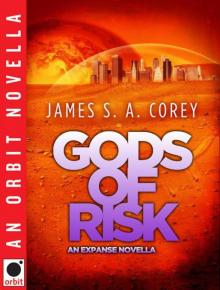 Gods of Risk
Gods of Risk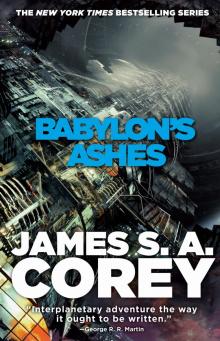 Babylon's Ashes
Babylon's Ashes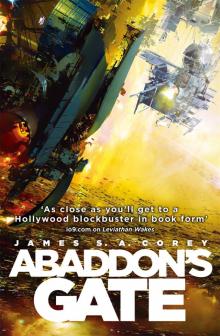 Expanse 03 - Abaddon’s Gate
Expanse 03 - Abaddon’s Gate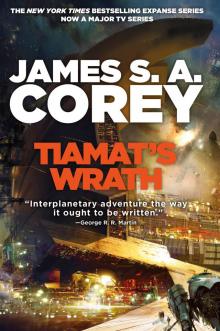 Tiamat's Wrath
Tiamat's Wrath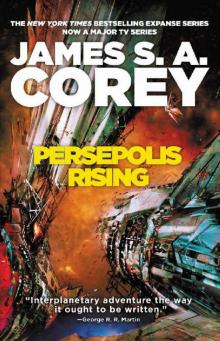 Persepolis Rising
Persepolis Rising The Butcher of Anderson Station
The Butcher of Anderson Station The Churn
The Churn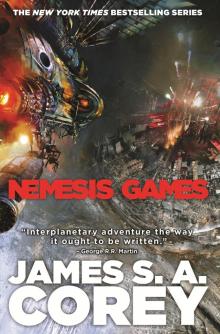 Expanse 05 - Nemesis Games
Expanse 05 - Nemesis Games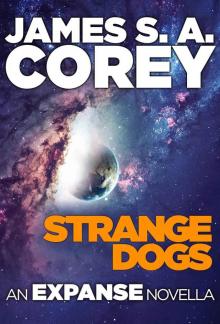 Strange Dogs
Strange Dogs Honor Among Thieves: Star Wars
Honor Among Thieves: Star Wars Cibola Burn
Cibola Burn Caliban's War
Caliban's War The Vital Abyss
The Vital Abyss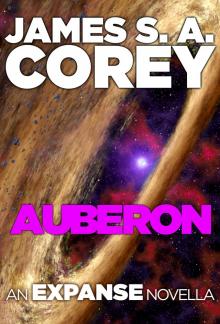 Auberon
Auberon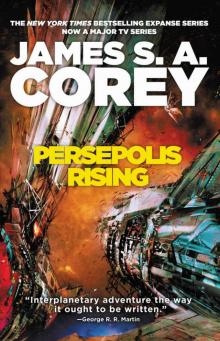 Persepolis Rising (The Expanse)
Persepolis Rising (The Expanse) Caliban's War: Book Two of the Expanse series
Caliban's War: Book Two of the Expanse series Leviathan Wakes: Book One of The Expanse
Leviathan Wakes: Book One of The Expanse Cibola Burn (Expanse)
Cibola Burn (Expanse)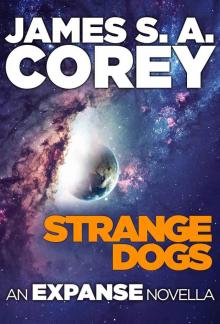 Strange Dogs (Expanse)
Strange Dogs (Expanse) The Vital Abyss: An Expanse Novella (The Expanse)
The Vital Abyss: An Expanse Novella (The Expanse) Leviathan Wakes e-1
Leviathan Wakes e-1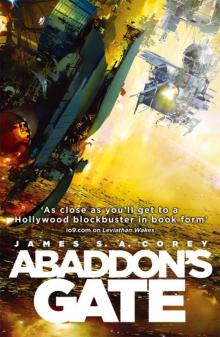 Abaddon's Gate e-3
Abaddon's Gate e-3 Caliban;s war e-2
Caliban;s war e-2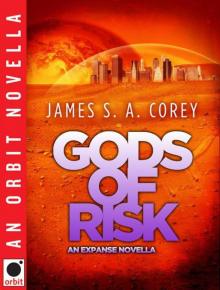 Gods of Risk: An Expanse Novella
Gods of Risk: An Expanse Novella Honor Among Thieves: Star Wars (Empire and Rebellion)
Honor Among Thieves: Star Wars (Empire and Rebellion)